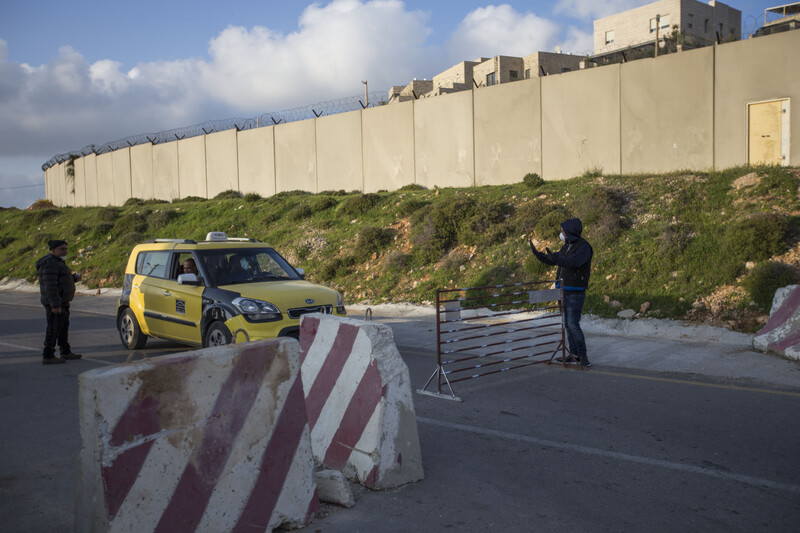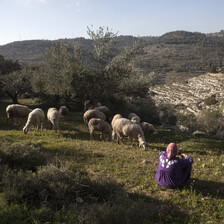The Electronic Intifada 15 May 2020

Residents of al-Walaja have set up a checkpoint in a bid to contain the coronavirus.
ZUMA PressIt has been two months since the occupied West Bank went into coronavirus lockdown and rural Palestinian towns and villages have been disproportionately impacted by the disease.
The virus was first diagnosed in the southern West Bank city of Bethlehem in early March. Since then, it has spread to districts across the West Bank, with many new cases being reported outside of major cities.
The Palestinian Authority’s jurisdiction only really covers 18 percent of the West Bank. Known as Area A, that zone includes such cities as Ramallah, Bethlehem, Jenin and Nablus.
Although the PA is theoretically responsible for security in these cities, Israel has often subjected them to military raids – with the acquiescence of the world’s most powerful governments and institutions.
Since the Oslo accords were signed in the 1990s, the PA has acted as something of a proxy for the Israeli occupation. Supervised by the US and the European Union, the PA’s police have been required to coordinate their activities with Israel’s forces of occupation.
In practice, that has meant the PA’s police have frequently arrested and tortured fellow Palestinians.
One consequence of acting as Israel’s proxy has been that the PA’s police have no real autonomy. That has been evident during the coronavirus pandemic – where the PA police have not been able to access communities requiring protection.
The PA’s police have no official presence in Area C – a zone designated under the Oslo accords. Incorporating Israel’s largest settlements, it comprises more than 60 percent of the West Bank.
The same applies to Area B, a smaller zone where the PA is nominally in charge of “civil” matters but the Israeli occupation takes full responsibility for “security.”
Palestinians living in Areas B and C are being left to fend for themselves.
“Living in Area C is difficult all year round, but even more so during the coronavirus,” Moataz Bisharat, an activist in the northern Jordan Valley, told The Electronic Intifada.
“The Palestinian government cannot officially help us here, but when we try to help ourselves, the Israeli occupation stands in our way,” Bisharat said. “It’s a lose-lose situation.”
New challenges
Since a state of emergency was declared on 5 March, there have hundreds of confirmed cases of COVID-19 in the West Bank.
While the initial outbreak was contained to the city of Bethlehem, the virus began to spread to other parts of the West Bank, particularly in rural areas, where many residents are employed as laborers in Israel or Israeli settlements.
The first major outbreak outside of the city happened in the Biddu enclave. That cluster of villages is technically under the jurisdiction of the Israeli-controlled Jerusalem municipality but located on the West Bank side of Israel’s apartheid wall.
The outbreak began with the return of a number of local laborers who work in Israel.
With the PA’s police unable to enter the villages without permission from Israel, and a complete lack of services from Israeli authorities, locals are left largely to fend for themselves, resulting in a rapid spread of the virus.
“When we saw what happened in Biddu and those villages, we knew that we had to take the proper precautions to prevent that from happening,” Salem Abu Teen, 50, a resident of the village of al-Walaja, nestled in the hills between Bethlehem and Jerusalem.
Al-Walaja has a total area of 4,328 dunums (1,069 acres). As a result of the Oslo accords, the village was placed under Israel’s control for “security” purposes.
Due to the classification of their land as primarily Area C, residents of al-Walaja are no strangers to the challenges that come with it. Those challenges include home demolitions, the denial of Israeli building permits and a lack of services from the PA.
But when the coronavirus hit, the people of the village were suddenly faced with a host of new challenges.
Taking matters into their own hands
The first order of business for Abu Teen and other residents was to set up an emergency committee to deal with the virus, and erect a makeshift checkpoint at the entrance to the village using large stones.
“We have more than 300 residents of al-Walaja who have Jerusalem IDs and travel back and forth between Israel and al-Walaja for work, so that was one of our biggest concerns, that they would bring the virus here with them,” Abu Teen said.
With the checkpoint, staffed by volunteers, the group could track who was coming in and out of the village.
“And if they weren’t a resident, they wouldn’t be allowed in,” Abu Teen said, adding that “many of the residents have relatives in Bethlehem, so we needed to ensure that people weren’t having visitors or vice versa.”
The absence of the PA’s police has forced dozens of checkpoints similar to those at the entrance of al-Walaja to pop up in villages across the West Bank, staffed by volunteers wearing neon colored vests.
“We have to monitor people’s movements and enforce social distancing, which isn’t easy,” Abu Teen told The Electronic Intifada. “At first people didn’t really respect our authority the way they would with the police.”
Abu Teen and his group had requested uniformed PA police officers to establish a presence in the village, but “they said because it’s Area C they can’t.”
“We have been able to secure some supplies such as masks, gloves and hygiene products from the PA,” Abu Teen said, adding that some PA officers in civilian clothes have come to help the volunteers “under the table.”
“We appreciate their efforts, but they just don’t have the same control here as they do in the city,” he said.
Occupation stands in the way
With no PA presence in their villages, people like Abu Teen and his neighbors are not only unprotected against the coronavirus but against the Israeli occupation as well.
In fact, when Abu Teen and his fellow volunteers set up their first roadblock at the entrance to the village, they were confronted by armed Israeli soldiers who forcibly removed their makeshift checkpoint.
“They pushed the stones away saying we constructed it illegally,” Abu Teen said. “We argued but they wouldn’t let us put them back.”
International law requires that Israel – as the occupying power – is obligated to meet the basic needs of Palestinians living under occupation. That should mean providing Palestinians with the means to protect themselves from COVID-19.
“But the Israelis only enforce their authority for ‘security reasons’ like arresting us and destroying our homes,” Abu Teen said. “But when it comes to protecting civilian matters, like fighting the coronavirus, they do nothing.”
In the northern Jordan Valley, where Israeli violations have increased in recent months following US-backed annexation efforts in the area, residents are struggling to protect themselves on all fronts.
“Most of the Jordan Valley is Area C, made up of villages of rural herding communities,” the activist Moataz Bisharat told The Electronic Intifada. For many communities, he said, the nearest hospital or basic health clinic is more than 20 km away.
Just like in the Biddu enclave, social distancing is extremely difficult to enforce in the Jordan Valley, according to Bisharat.
“It’s been difficult because of the culture and nature of the Bedouin communities,” Bisharat said, adding that activists have “undertaken efforts to educate the communities and change their herding practices so as not to interact with the other communities.”
“We thought the best way to enforce this would be to put up temporary borders between the communities, but the Israeli army came and destroyed them,” Bisharat said.
In another instance, which was condemned by human rights groups, Israeli forces tore down a field clinic that was being set up in the northern Jordan Valley, and confiscated building materials and equipment for the center.
“They took everything, and brought bulldozers to destroy the foundation of the clinic that had been laid down,” he said.
Additionally, Bisharat said that they have seen a rise in settler attacks in the area, while the military continues to demolish structures and issue demolition orders on homes.
“Israel controls our lives when it comes to our movement and building houses and hospitals,” Bisharat said. “But at the same time, the Israeli government is not giving us the proper resources or treatment to fight this virus.”
Bisharat said the PA has assisted the communities in other ways, by providing them with hygiene products and some personal protective gear, as well as assisting Bedouin farmers in the sale of their products.
“But when it comes to actual security they can’t do anything in Area C,” he said. “Meanwhile, the Israeli government has not done anything for these people, and on the contrary have made their lives only more difficult during this time.”
“We are trying to fight this virus like the rest of the world, but we have to face the obstacles of coronavirus as well as the occupation.”
Akram al-Wa’ara is a journalist based in Bethlehem.




